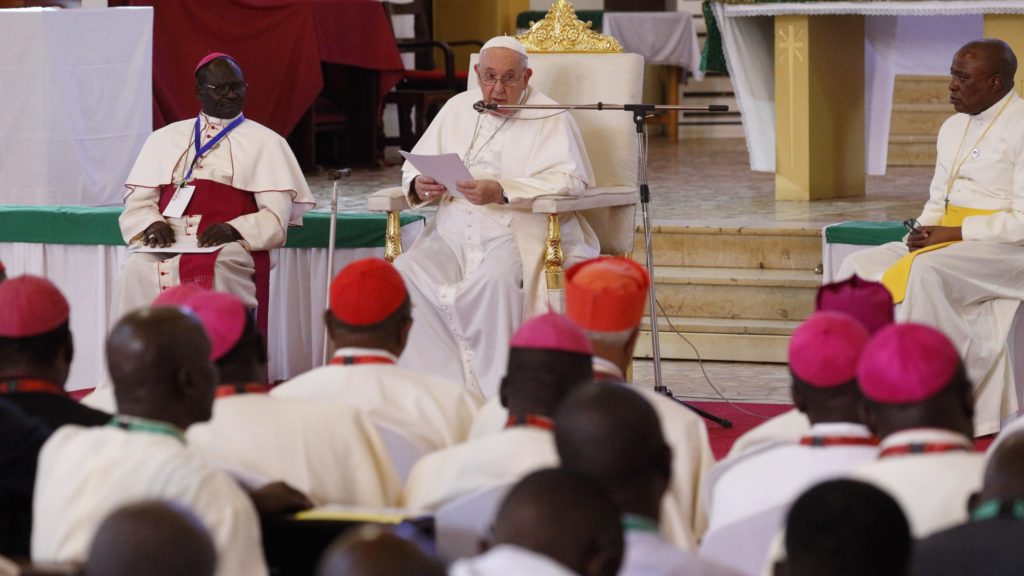When Pope Francis prayed that the bishops, priests and religious in South Sudan would be "generous pastors and witnesses, armed only with prayer and love," he was, in many ways, preaching to the choir.
At a meeting in St. Theresa's Cathedral in Juba Feb. 4, he asked them to let themselves "be constantly surprised by God's grace."
The smiles on the faces of the hundreds of churchworkers inside the cathedral and the thousands of members of their flocks outside showed that kind of openness.
Irish Loreto Sister Orla Treacy, director of a school in Rumbek, was inside, but she took journalists outside to meet some of the 50 students and alumni who had made a "hybrid" pilgrimage with her to Juba; over nine days, they alternated walking -- totaling 110 miles -- and catching rides for about 140 miles.
James Gawar, 20, told Catholic News Service, "The best part of our journey was the drama we presented along the way" in the villages where they stopped each night. "The drama is about peace."
"My hope for the visit of the pope is peace and reconciliation in South Sudan," he said. "This is possible because with the visit of the pope we are united."
Ariong Tina Deng, 18, said that for her, "the best part of the journey was when we went to the Nile to swim and then we ate fish. Every village made a feast for us."
"At first we were kind of scared" going to villages where they knew no one, she said. "But when we arrived 5 kilometers from the villages, people were waiting to welcome us. They walked with us, and we all danced, and we see we all want peace."
Sister Treacy told CNS that most of the students had never been out of their county, let alone out of Lakes State. When they were sharing at the end of their last day on the road, "they all said they had been frightened. But the welcome was wonderful, and they experienced that we are all the same."
Instead of having a religious sister speak on behalf of all the women present about their ministry in the country, the pope's meeting in South Sudan featured a presentation about the lives and deaths of Sacred Heart Sisters Mary Daniel Abut and Regina Roba Luate, who were caught in an ambush and killed in August 2021.
In his speech to the bishops, religious and priests, Pope Francis said he wanted to focus on "what it means for us to be ministers of God in a land scarred by war, hatred, violence and poverty."
First, he said, it means being humble, remembering that faith is about God and not one's own personality or talents.
"Deep down, we can think that we are at the center of everything, that we can rely, if not in theory at least in practice, almost exclusively on our own talents and abilities," he said. "Or, as a church, we think we can find an answer to people's suffering and needs through human resources, like money, cleverness or power. Instead, everything we accomplish comes from God: he is the Lord, and we are called to be docile instruments in his hands."
Ministry in South Sudan also includes a willingness to intercede on behalf of the people, and not just in prayer, the pope said. To intercede means to "place ourselves in the midst of our people, to act as a bridge that connects them to God."
"Our first duty is not to be a church that is perfectly organized," he insisted, "but a church that, in the name of Christ, stands in the midst of people's troubled lives, a church that is willing to dirty its hands for people."
And, he said, an authentic proclamation of the Gospel requires believers "to raise our voices against the injustice and the abuses of power that oppress and use violence to suit their own ends amid the cloud of conflicts."
For Father Peter Othow, a pastor in Malakal, the devastation caused by almost 10 years of war is right outside his door. The city had some 60,000 inhabitants before the fighting broke out, he said, now it is half that while the nearby U.N.-run camp for displaced people exceeded its capacity in December and hosts some 50,000 people.
"The visit of the pope means hope," he told CNS.

